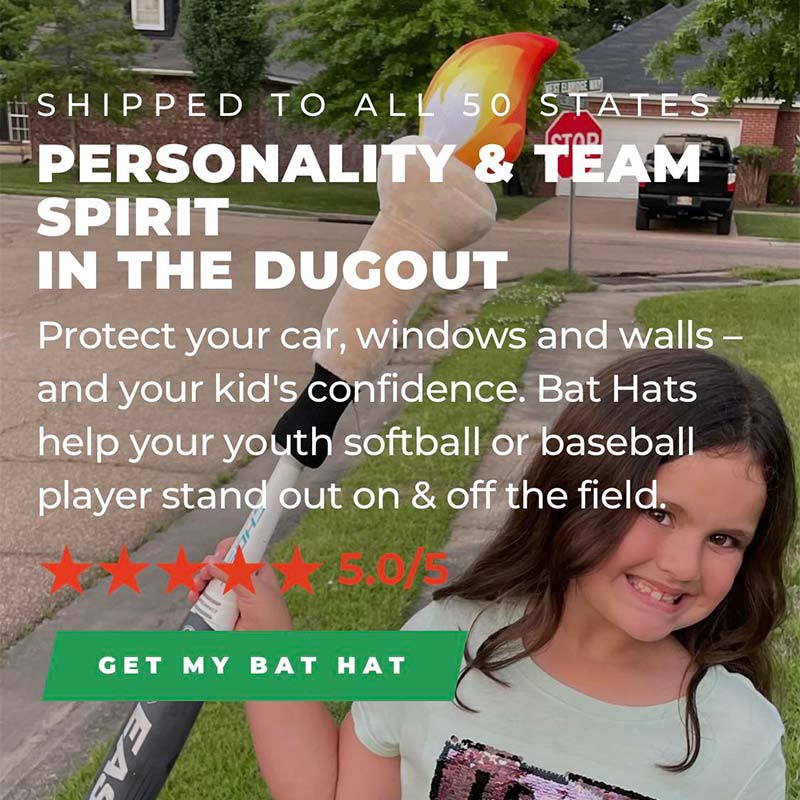My Daughter Plays Outfield
You or your daughter is an outfielder. Congratulations to you!
 That means that your daughter is likely extremely athletic, quick, has an amazing glove, and has proven herself to be quite the hustler. After all, how many other positions on the field are required to cover such a vast amount of green space. There’s like 5 feet between a short stop and a third baseman, another 5 feet between a 2nd baseman and a 1st baseman. The chance of one of them getting a ball is pretty darn good.
That means that your daughter is likely extremely athletic, quick, has an amazing glove, and has proven herself to be quite the hustler. After all, how many other positions on the field are required to cover such a vast amount of green space. There’s like 5 feet between a short stop and a third baseman, another 5 feet between a 2nd baseman and a 1st baseman. The chance of one of them getting a ball is pretty darn good.
But, depending on the outfield you (or your daughter) plays in, there is a wide open span of 30, sometimes 40, feet between her and the next closest player. And that means that your daughter (or you) are required and probably able to cover a heck of a lot of ground in a short period of time.
Plus, the pressure. A ball that goes passed an outfield usually results in a stand up double, or triple depending on the speed of the runner and the placement of the ball. Adding to the pressure is the fact that any runners on base will undoubtedly score if the outfield is weak. This is why outfielders have such incredibly strong arms. I have seen some pick up a ball from the fence and throw it clear to the pitcher’s mound – even to the catcher, saving game winning runs from crossing the plate. To be honest, that is pretty dang impressive, and there aren’t too many girls that can actually 1)handle the pressure and 2) be that fast on the fly ball and 3) throw a 12 inch ball like that.
Knowing all this. Knowing that games are literally won and lost in the outfield – why is that so many people are still stuck on the adage of ‘my daughter is stuck in the outfield?’
People say this as if it means their daughter has been cast off an island, as if it is some sort of slam against the child. Why are people so disappointed to see their daughter moved to the outfield, or playing centerfield? I’ve heard, “My daughter has played second base her whole life and now that she is in high school the stupid coach put her in centerfield,” from huffing and puffing parents.
Ummm hello – that likely means that your daughter (or you the player) have proven yourself to be a hustler with a good glove, a stellar arm, speed in your feet and the ability to get to the ball, dive to make a play, and most importantly HAS THE HEART to play one of the three most difficult positions on the field.
The older a softball player gets, the more dependent a team is on having not just a strong and swift outfield, but a solid one. An infield is nothing without an outfield behind them. A pitcher is nothing without an outfield working their butts off to cover ground to save runs. A team cannot win without outfielders.
EVEN IF only TWO BALLS WERE HIT TO LEFT FIELD ALL DAY, YOU CAN BET YOUR BUTT THOSE TWO BALLS ARE THE ONES THAT WILL EITHER WIN OR LOSE THE BALLGAME!
Which means that a great outfielder is a game changer, a game saver, AN INTEGRAL PART OF A SUCCESSFUL TEAM. Someone just go ahead and try and tell me that Michelle Moultrie is not a hero? Or Jason Heyward? Those folks are game changers.
Playing outfield is a privilege. It really is a shame that so many parents and fans of softball tend to look like the outfield is a demotion to a player. It’s even more upsetting when parents and fans share their perception of ‘Oh well, my daughter is just STUCK in the outfield,” and pass it on to their daughter on the field. When you really look at it, from a coaching, strategic and common sense standpoint – the OUTFIELD and the girls that take it on are HEROES! Those high fly balls and screaming pea shots, and nearly over the fence hits are not easy to catch. And the chances of one ball being directly hit to an outfielder are slim to none (especially in close games) which means that those girls are there because they can command a lot of space and make amazing plays.
Seriously people! There are nine positions on a softball field. Beyond a certain age (which is getting younger and younger every year), all NINE of those positions are IMPORTANT. The outfield is not the equivalent to being benched. No one is saying your daughter, (or you) are terrible because you play in the outfield. In fact, a coach has to field his team in the most productive way possible. As adults, we have to empower our outfielders just like we do our pitchers and catchers.
Perception changes everything. And if you play outfield, or know someone who does – HERE IS BIG KUDO to you for being a hustler. A down and dirty, speedy and gritty little ball player who will do everything and anything it takes to keep a ball from hitting the green.
3 Comments
Leave a Comment
You must be logged in to post a comment.
get sifg in your inbox
Receive occasional updates about sales, new products, coupon codes, and more!











[…] Here’s the link: http://www.sifg2021clone3.flywheelsites.com/2013/10/09/daughter-plays-outfield/ […]
I have been searching for a great paragraph about outfielders to show some parents! I am an assistant coach to a softball team. They are 10u. We have 4 year olds to 11 year olds on the team. Some teams we play are very young and struggle to hit the ball while some are older and crack it over fences. Our catcher and third baseman are a really good team and we do a lot of throw downs to third, but sometimes the third baseman misses a ball and our left fielder gets it and throws it all the way home. The left fielder’s mom struggles to understand why we put her there and thinks since she is better than the second baseman she should be playing second base. The second baseman doesn’t move her feet and won’t back up plays. We have a right center behind her that is fast to make up for her missing balls and to make sure ones up the middle are caught. The right center and the left fielder also cover a lot of ground because we have a few little ones out there with them. . The right centers parents seem to understand their daughter being outfield though. We have tried everything to explain to the left fielders parents but they just keep screaming. We have tried to put her on second but she tend to overthrow the first baseman if the ball is hit to her. I don’t know how to make them see this is the best spot for their daughter and for the team. I tried to explain that I was an outfield for the high school and a college team but I think it just made them hate me more as “I don’t understand the infield” so I found this to share with them and hopefully they get it. If not, I don’t see the head coach asking her to be on the tournament team at the end of regular little league season and will take one of the 5 or 6 year olds instead because they will try hard and their parents won’t complain. Me and the other coaches don’t know what else to do. If anyone has any advice on how to deal with them, please give some ideas to me. Also we practice them in every position and during regular season little league games most switched positions so we do teach all of them every position.
At the young ages (under 18), and ESPECIALLY IN A RECREATION LEAGUE, this article’s advice is pure propaganda.
If the outfield is so important, then…
1) the least skilled players would NOT be buried there
2) those least skilled players WOULD touch the infield some time EACH game. EACH GAME.
But guess what, you’re trying to manipulate the parents and players that have to stay in the outfield, and it’s wrong. It’s not the job of the kid “that is always in the outfield” to change their perspective on always playing outfield. Not until the coach changes their perspective on opening up the infield for them.
Once the coach does that. then I can tell my daughter to do her best in the outfield without feeling we’re being used (because we are). You took our registration money, not a discount, and we get a discounted experience. We paid the same amount of money as the players that hold down the infield and you’re demanding us to show up the same amount of practices, with the same commitment, etc, and to always play a position we don’t want to be in. Any argument made to hold these players in outfield is just ruining the experience of softball for those suffering that experience. It is selfish.